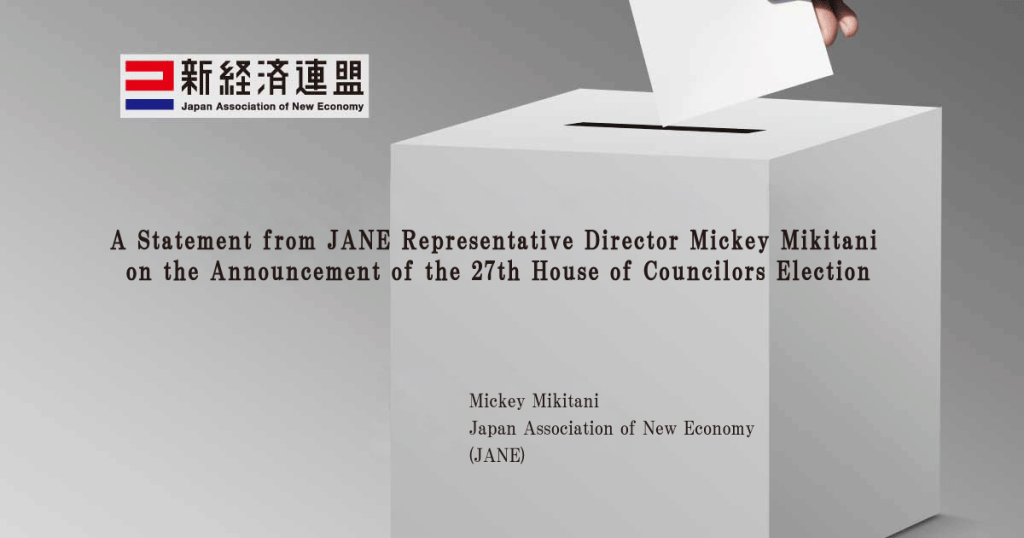- HOME
- Proposals/News
- Representative Director
- A Statement from JANE Representative Director Mickey Mikitani on the Announcement of the 27th House of Councilors Election
A Statement from JANE Representative Director Mickey Mikitani on the Announcement of the 27th House of Councilors Election

Today, the 27th House of Councilors election was officially announced. The Japan Association of New Economy (JANE. Location: Minato-ku, Tokyo; Representative Director: Mickey Mikitani) issues the following statement from its representative director :
July 3, 2025
Japan Association of New Economy (JANE)
Representative Director
Mickey Mikitani
Japan’s nominal GDP growth rate in US dollar terms has been the only negative among G7 countries over the past 20 years, and its IMD World Competitiveness Ranking remains low, signaling a decline in international presence. In today’s virtual economy, led by the internet, smartphones, cloud computing and AI, outdated tax and regulatory systems continue to hamper economic growth and worsen the digital deficit. To overcome this stagnation and make Japan a country where people, knowledge, and capital gather from all over the world, bold and comprehensive structural reforms based on the principle of “Give more authority to private sector” are indispensable.
JANE strongly hopes that during this election, political parties and candidates will clarify their positions and engage in substantive debates on the following five key themes:
1. Tax Reform
Japan’s top marginal rates for income tax, corporate tax, inheritance tax and capital gains tax remain high compared to other countries, contributing to the outflow of people and capital domestically and internationally. Tax rates should be lowered to realize a virtuous cycle of taxation and growth, stimulating domestic investment and increasing tax revenue through economic revitalization. In addition, measures such as a hyper-depreciation tax system and enhanced R&D tax incentives should be strengthened to promote investment in AI and software, and the tax system should be reviewed to bolster the international competitiveness of Japanese companies.
2. Regulatory Reform
Excessive and unpredictable over-regulations hinder business activities and stifle innovation. To support the implementation of new technologies such as digital solutions, AI and blockchain, and to promote productivity improvements as well as the creation of new markets and industries, regulatory frameworks should be rebuilt through objective data-driven smart regulation. It is also necessary to consider introducing Regulatory Cost Cap System, which would abolish or reduce existing regulations when new regulations are introduced.
3. Local Government Reform
Amid ongoing overconcentration in Tokyo and depopulation of local areas, reforms are needed to enhance the fiscal and administrative autonomy of local governments and draw out their creativity to build sustainable local societies. Efforts should be made to streamline local administration using digital transformation (DX), to consider reallocating tax revenue sources, and to promote regional revitalization through mechanisms that support regions for striving for growth. These include invigorating the Furusato Nozei (hometown tax donation) program, creating tax incentives to people to move to regional areas, introducing tax measures to promote the relocation of corporate headquarters, and fostering company towns that serve as hubs of local economic activity.
4. Work Motivation Reform
Japan should shift from the conventional Work Style Reform, which tended to focus primarily on reducing working hours, to a Work Motivation Reform aimed at enhancing employees’ intrinsic motivation. This requires expanding the existing High-Level Professionals System, creating a new Growth-Supportive Labor System, and establishing a Work Motivation Reform Council to review the outcomes of past Work Style Reform initiatives, grasp actual labor shortages across various sectors and explore necessary policy responses.
5. Strategic Utilization of Foreign Human Resources –
In addition to implementing Work Motivation Reform and promoting investment in labor-saving solutions, it is essential to proactively attract highly skilled foreign professionals to foster innovation. As Japan faces a deepening structural labor shortage caused by its declining birthrate and aging population, it is an urgent priority to formulate a comprehensive population strategy and a basic policy for the strategic utilization of foreign human resources grounded in strict residency management and inclusive policies.
Through this election campaign, JANE expects concrete policy measures shaping Japan’s future to be presented and debated. As a startup among business associations, we will continue to actively make policy proposals to the government so that the power of the private sector can be fully unleashed and Japan’s economy can further develop on an equal footing with the rest of the world.
Note: JANE conducted a questionnaire survey on the above policy themes among prospective candidates for the House of Councilors election. Among those who responded, candidates who demonstrated strong alignment with JANE’s policy positions and capability for implementation, based on their responses, past political activities and social contributions, are published on our website. Those deemed to have deep insight and ability to implement measures in relation to the policy themes JANE considers particularly important are also included.

